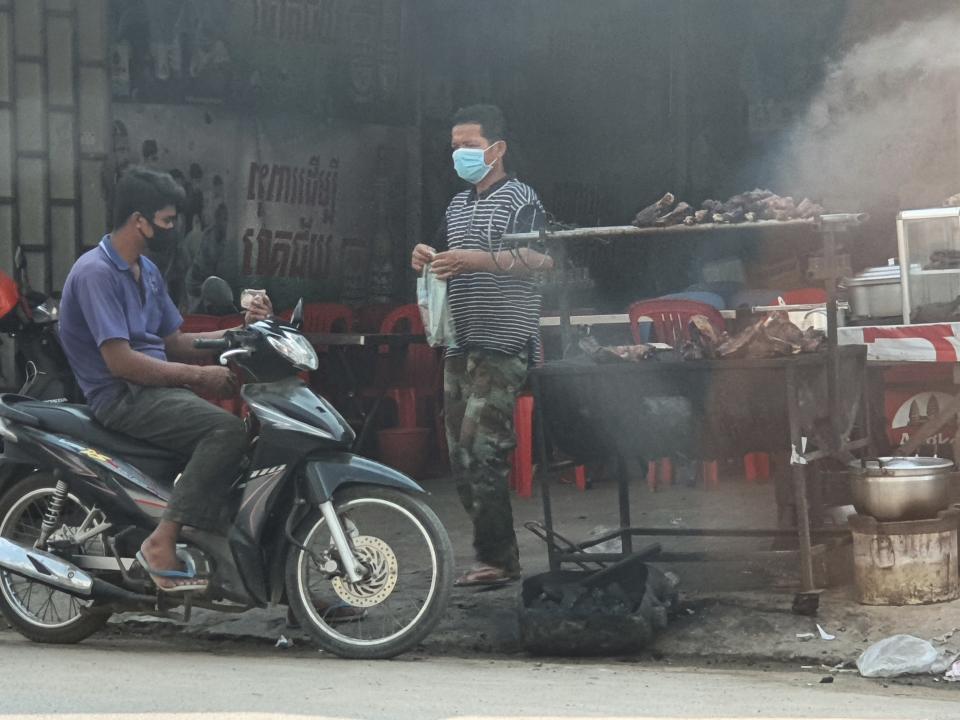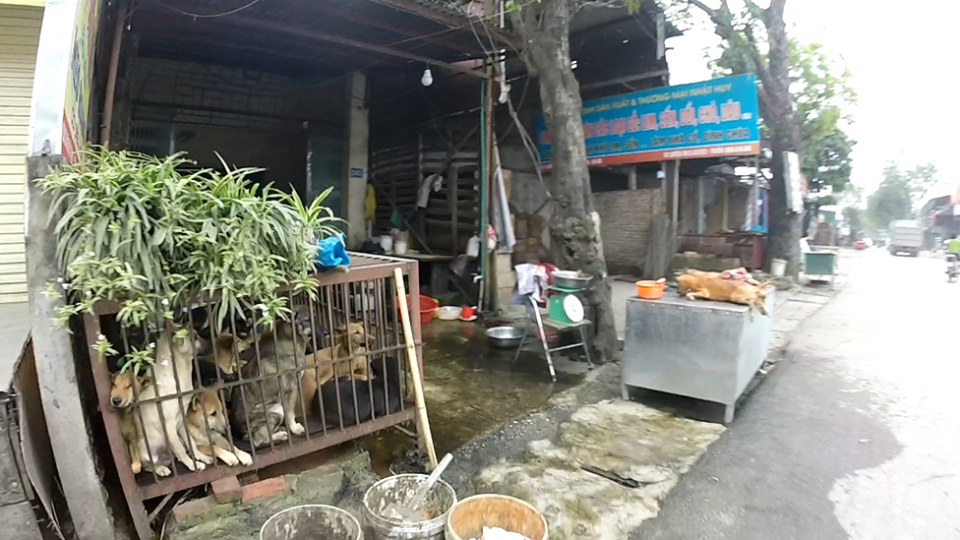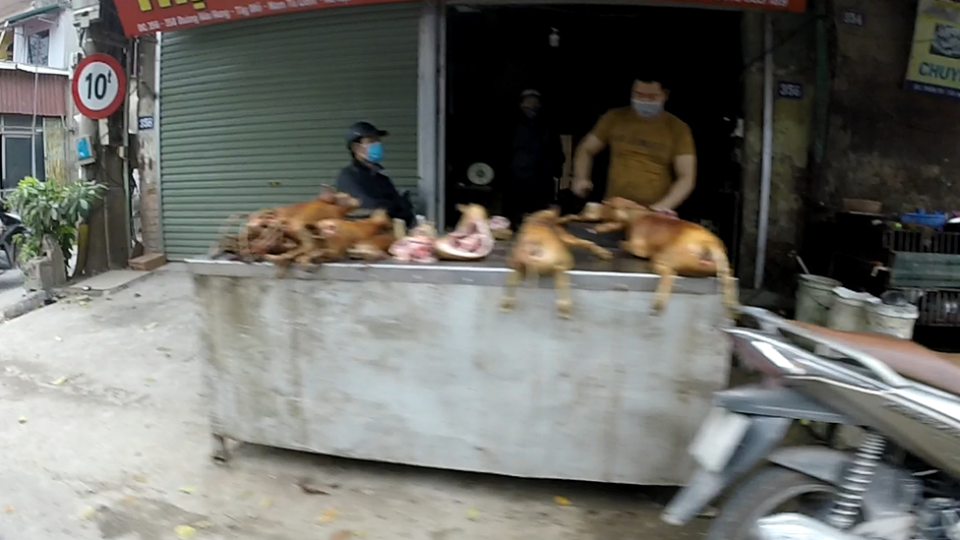Dangerous coronavirus myth leads to unexpected dog meat demand
WARNING – GRAPHIC CONTENT: There has been an increase in dog meat consumption due to a belief it will protect people who eat it from the coronavirus, according to investigators.
Four Paws veterinarian, Dr Kathryn Polak told Yahoo News Australia that investigations have found health practitioners in Cambodia commonly prescribe dog as a medical treatment, despite there being no evidence that it could have any impact on the deadly virus.
Traditionally it is believed that consuming the meat will warm the body which in turn helps fight diseases.

“We surveyed over 110 restaurants in the capital city, Phnom Penh, and yes, they largely are still open, but they’ve converted to this to go model,” she said.
“So we’re seeing a lot of people pulling up on motorbikes, the money is being exchanged, and they’re driving off with their dog meat in a bag.”
“Largely it seems they are operating unscathed considering the collapse of global economy, it’s just bewildering.”
Working for her children to stop the wet markets
A state of emergency has not yet been passed by parliament meaning Cambodians can still freely move around, although it is recommended that people only venture outside on essential errands.
Mother of three, Chea Kaew, not her real name, was contracted by Four Paws to build a picture of the ongoing operations of the dog meat wet markets in her country.
Ms Kaew began working as an investigator as a weekend job a year ago, but became personally invested in the issue and wants to “make things better”.

“Some sellers in the market they are open to talk, but normally in the slaughterhouse we are not welcome at all,” she told Yahoo News Australia.
“Sometimes we are not allowed to film or take photos and they push us out.
“We’ve been pushed out so many times.”
'Streets of horror': Wildlife trade continues despite coronavirus warning
'I was traumatised': Woman's daily walk interrupted by 'horrifying' find
'Limit human contact': How pet owners can help keep vets open amid pandemic
Worrying phone call before passengers disembarked Ruby Princess cruise
What worries her most is that despite an initial slump in sales after COVID-19 broke, business is now booming for dog meat restaurant owners and street-side raw meat butchers.
The zoonotic leap of the coronavirus from humans to animals is believed to have occurred in a wet market in Wuhan, China, where exotic species were slaughtered for customers in unsanitary conditions.
Ms Kaew is concerned about the lack of awareness that eating dog and cat meat from wet markets can be a public health risk.
Having seen that a tiger in the Bronx Zoo has contracted COVID-19, more than ever she would like to see action taken to shut down the wet markets.
Investigator uses GoPro to capture footage in Vietnam
Across the border in Vietnam, coronavirus restrictions have forced many of the country’s wet markets to close their doors, butchers are believed to be using a loophole to continue their trade.
Freelance investigator Bian Nguen, not her real name, ventured into the outskirts of Hanoi a little over a week ago for animal welfare charity Four Paws.

“I had the camera hidden because [in] that area especially, people are very suspicious,” Ms Nguen told Yahoo News Australia.
“If I just came looking around they wouldn’t like it, so I actually went with my boyfriend because I didn’t feel safe going alone.
“He helped to drive me on a motorbike and we had a GoPro which I kept very discreetly close to me and we just kind of drove back and forth slowly and I recorded video.”

While dog and cat meat is popular in the northern region with the older generations, many young people like Ms Nguen are against it, as it is not held to food safety regulations.
The shops she visited have cages on one side containing live animals and then an “open slaughterhouse” on the other.
Cats and dogs are killed in front of the customer and the other animals, and then chopped up on a table out on the street, leaving her concerned about the hygiene.
“I was there for two and a half to three hours in the morning, and most of the stalls had customers buying,” Ms Nguen told Yahoo News Australia.
“That area there is about 10 or more shops and restaurants selling dog meat, but when I was there last week there were four to five places that were open.
“Most of them were selling raw meet to go because the government had ordered all non-essential businesses to shut down and restaurants are not supposed to be open.”
Restaurants sell out of dog meat
Between 9am and 11am, Ms Nguen noted that one of the market stalls completely sold out of freshly slaughtered animals.
The Vietnamese government had implemented public health policies well ahead of other countries in the region, shutting down schools and recommending social distancing.
On April 1, they introduced more stringent lockdowns, preventing Ms Nguen from heading back out onto the street, to see if the stallholders are complying.
Even if the lockdowns have affected the restaurants, they have another avenue to sell their wet meat – mobile phone apps.
On Tuesday night, Ms Nguen checked one of the country’s largest food delivery apps and found five restaurants that sell dog and cat meat advertising home delivery service.
Do you have a story tip? Email: newsroomau@yahoonews.com.
You can also follow us on Facebook, Instagram and Twitter and download the Yahoo News app from the App Store or Google Play.





